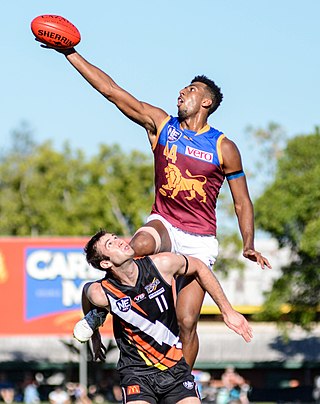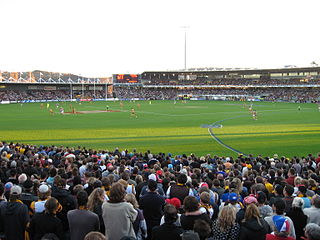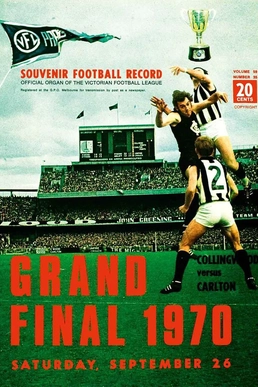
Australian rules football, also called Australian football or Aussie rules, or more simply football or footy, is a contact sport played between two teams of 18 players on an oval field, often a modified cricket ground. Points are scored by kicking the oval ball between the central goal posts, or between a central and outer post.
A head coach, senior coach, or manager is a professional at training and developing athletes. They typically hold a more public profile and are paid more than other coaches. In some sports, the head coach is instead called the "manager", as in association football and professional baseball. In other sports, such as Australian rules football, the head coach is generally referred to as the senior coach.

Gary Kirsten is a South African cricket coach and former cricketer. He has coached the Indian Cricket Team as well as the South African Cricket team. Kirsten was a member of the South Africa team that won the 1998 ICC KnockOut Trophy, the only ICC trophy the country has won till date.

In sports broadcasting, a sports commentator provides a real-time commentary of a game or event, usually during a live broadcast, traditionally delivered in the historical present tense. Radio was the first medium for sports broadcasts, and radio commentators must describe all aspects of the action to listeners who cannot see it for themselves. In the case of televised sports coverage, commentators are usually presented as a voiceover, with images of the contest shown on viewers' screens and sounds of the action and spectators heard in the background. Television commentators are rarely shown on screen during an event, though some networks choose to feature their announcers on camera either before or after the contest or briefly during breaks in the action.

Interchange is a team position in Australian rules football, consisting of players who are part of the selected team but are not currently on the field of play.

Andrew Maher is an Australian sports journalist and broadcaster for the Seven Network and Melbourne sport radio station 1116 SEN. He is best known for covering both Australian rules football and the Big Bash League for the Ten television network, as well as hosting AFL review program Before the Game.

The laws of Australian rules football were first defined by the Melbourne Football Club in 1859 and have been amended over the years as Australian rules football evolved into its modern form. The Australian Football Council (AFC), was formed in 1905 and became responsible for the laws, although individual leagues retained a wide discretion to vary them. Following the restructure of the Victorian Football League's competition as a national competition and the League's renaming to be the Australian Football League (AFL), since 1994, the rules for the game have been maintained by the AFL through its Commission and its Competition Committee.

The AFL Grand Final is an Australian rules football match to determine the premiers for the Australian Football League (AFL) season. From its inception until 1989, it was known as the VFL Grand Final, as the league at that time was the Victorian Football League. Played at the end of the finals series, the game has been held annually since 1898, except in 1924. It is traditionally staged on the afternoon of the last Saturday in September, at the Melbourne Cricket Ground. As the premier match of the AFL season, it attracts one of the largest audiences in Australian sport, regularly attracting a crowd of more than 100,000 and a television audience of millions.

Jobe Watson is a former professional Australian rules footballer who played for the Essendon Football Club in the Australian Football League (AFL). Watson, the son of three-time Essendon premiership champion Tim Watson, was drafted by Essendon under the father–son rule in the 2002 national draft, and went on to become one of the best midfielders of the modern era. A dual All-Australian and three-time Crichton Medallist, he captained Essendon from 2010 to early 2016, and was the face of the Essendon playing group during the most turbulent period in the club's history.

An umpire is an official in the sport of Australian rules football who adjudicates the game according to the "Laws Of The Game", the official handbook of Australian Rules Football. Umpiring the game of AFL across all leagues has been subject to long history of abuse, which in more recent times the AFL has taken steps to help stamp out.

The AFL siren controversy, informally known as Sirengate, was the controversial conclusion and result of an Australian rules football match played on 30 April 2006 during round 5 of the Australian Football League's 2006 season. The match was played between the St Kilda and Fremantle Football Clubs at Aurora Stadium in Launceston, Tasmania.

The 2004 AFL Grand Final was an Australian rules football game contested between the Port Adelaide Football Club and the Brisbane Lions, held at the Melbourne Cricket Ground in Melbourne on 25 September 2004. It was the 108th annual grand final of the Australian Football League, staged to determine the premiers for the 2004 AFL season.
Jack Elder was an Australian rules football umpire who in 1996 was named as the VFL/AFL's "Umpire of the Century".

The 2001 AFL Grand Final was an Australian rules football game contested between the Essendon Bombers and the Brisbane Lions, held at the Melbourne Cricket Ground in Melbourne on 29 September 2001. It was the 105th annual grand final of the Australian Football League, staged to determine the premiers for the 2001 AFL season. The match, attended by 91,482 spectators, was won by Brisbane by a margin of 26 points, marking the club's first premiership since it was established in 1997.

The 1970 VFL Grand Final was an Australian rules football game contested between the Carlton Football Club and Collingwood Football Club, held at the Melbourne Cricket Ground (MCG) on 26 September 1970. It was the 73rd annual Grand Final of the Victorian Football League, staged to determine the premiers for the 1970 VFL season. The match was won by Carlton by a margin of 10 points, marking that club's 10th premiership victory.

This list is an alphabetical glossary of Australian rules football terms, jargon and slang. While some of these entries are shared with other sports, Australian rules football has developed a unique and rich terminology.

The role of a Wales national football team manager was first established in 1876, when the Wales national football team was established, and the team was chosen by a panel of selectors. The team captain would at that point fulfil the role of match day coach. Since 1954 a manager has been appointed by the Football Association of Wales.
The QClash is the name given to the Australian rules football rivalry match between the Brisbane Lions and Gold Coast Suns, who both participate in the Australian Football League (AFL). The first men's QClash was held in 2011, with Gold Coast winning by 8 points at home. The game achieved the record for the highest pay TV viewing audience ever for an AFL game, with a total of 354,745 viewers tuning in to watch the game on Foxtel channel Fox Footy.

The 2017 AFL Grand Final was an Australian rules football game contested between the Adelaide Football Club and the Richmond Football Club at the Melbourne Cricket Ground on 30 September 2017. It was the 122nd annual grand final of the Australian Football League staged to determine the premiers for the 2017 AFL season. The match, attended by 100,021 spectators, was won by Richmond by a margin of 48 points, marking the club's eleventh VFL/AFL premiership and first since 1980. Richmond's Dustin Martin was awarded the Norm Smith Medal as the best player on the ground.
The 2019 CFL season was the 66th season of modern-day Canadian football. Officially, it was the 62nd Canadian Football League season. The regular season began on June 13 and concluded with the playing of the 107th Grey Cup in Calgary on November 24 —where the Winnipeg Blue Bombers defeated the Hamilton Tiger-Cats 33–12 to win their first Grey Cup since 1990.
















